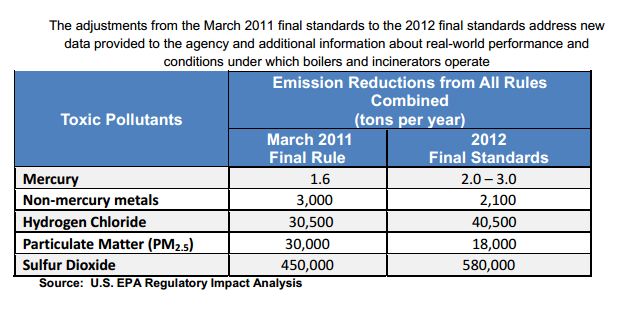Recently, on Dec 20, 2012, revisions were made to the Clean Air Act’s regulations for major and area source boilers and commercial/ industrial solid waste incinerators. As most boilers burn some form of fossil fuel, this revision is of great importance to most manufacturing and process plants.<
According to the Overview Technical Fact Sheet provided on the EPA’s website, these changes will not apply to 86 percent of all the boilers in the United States. For 13 percent of boilers, the EPA will simply rely on work practice standards to reduce emissions.
Less than 1 percent of boilers are deemed the “highest emitting” of pollutants, and they will be expected to upgrade their boilers to meet the emission limits. The chart below is from the EPA fact sheet and shows the difference between the March 2011 emission reductions and the 2012 changes.
According to the EPA website, these numbers were reached after reviewing several petitions sent by business and plant owners in regards to the March 2011 rules and additional research performed by the EPA. The chart shows the emission reductions for mercury, hydrogen chloride and sulfur dioxide have increased. On the other hand, the reductions for non-mercury metals and particulate matter have decreased.
Major source boilers that are subject to the above emission reductions must comply by 2016, although they may request an additional year if needed. Area source boilers will have until March 21, 2014 to comply and also may request and additional year as needed.
In addition to adjusting emission limits, other main modifications to the March 2011 rules include:
- Adding to and refining the list of sub categories of boilers
- Increasing time to implement the standards
- Maintaining numerical emission limits for the highest emitting 0.4 percent of all boilers.
With these new standards, the EPA claims 8,100 deaths, 5,100 heart attacks and 52,000 asthma attacks will be prevented.
Cleaner energy and less pollution obviously benefit the health and well-being of nearby communities, but it can also help your bottom line. Synergy focuses on saving our clients’ money, often by developing control systems that waste less fuel and thereby reducing the emissions a boiler or plant produces. If you are curious about how much money you can save, send us a message at info@synsysinc.com or call 630-724-1969 x12.


